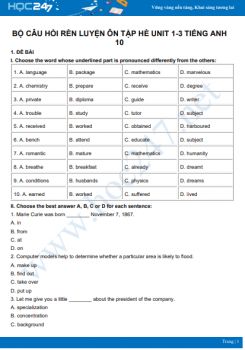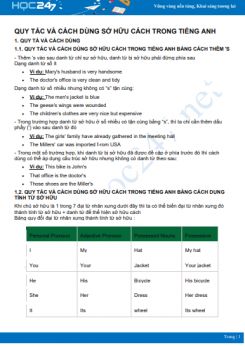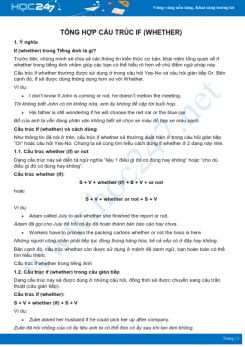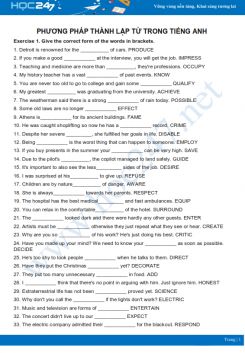DŲ░ß╗øi ─æ├óy l├Ā nß╗Öi dung t├Āi liß╗ću Vocabulary and Grammar Revision for Unit 1 Tiß║┐ng Anh 10 gi├║p c├Īc em hß╗Źc sinh lß╗øp 10 c├│ th├¬m t├Āi liß╗ću ├┤n tß║Łp r├©n luyß╗ćn k─® n─āng l├Ām b├Āi ─æß╗ā kh├Īi qu├Īt nhß╗»ng nß╗Öi dung trß╗Źng t├óm cß╗¦a Unit 1 Tiß║┐ng Anh 10 c┼®ng nhŲ░ chuß║®n bß╗ŗ cho c├Īc k├¼ thi sß║»p ─æß║┐n ─æŲ░ß╗Żc HOC247 bi├¬n soß║Īn v├Ā tß╗Ģng hß╗Żp ─æß║¦y ─æß╗¦. Hi vß╗Źng t├Āi liß╗ću sß║Į c├│ ├Łch vß╗øi c├Īc em.
Ch├║c c├Īc em c├│ kß║┐t quß║Ż hß╗Źc tß║Łp tß╗æt!
VOCABULARY AND GRAMMAR REVISION FOR UNIT 1 TIß║ŠNG ANH 10
UNIT 1: A DAY IN THE LIFE OF .......... (Mß╗Öt ng├Āy trong cuß╗Öc sß╗æng cß╗¦a....)
PHß║”N I: Tß╗öNG Kß║ŠT Tß╗¬ Vß╗░NG V├Ć NGß╗« PH├üP
A . VOCABULARY
1. daily routine /╦łde╔¬li ru╦É╦łti╦Én/ (n): th├│i quen hß║▒ng ng├Āy, c├┤ng viß╗ćc hß║▒ng ng├Āy
2. bank /b├”┼ŗk/ (n) (n): bß╗Ø
3. boil /b╔ö╔¬l/ (v): luß╗Öc, ─æun s├┤i(nŲ░ß╗øc)
4. plough /pla╩Ŗ/ (v): c├Āy( ruß╗Öng)
5. harrow /╦łh├”r╔Ö╩Ŗ/ (v): bß╗½a(ruß╗Öng)
6. plot of land (np): thß╗Ła ruß╗Öng
7. fellow peasant /╦łfel╔Ö╩Ŗ ╦łpeznt/ (np): bß║Īn n├┤ng d├ón
8. lead /liːd/ (v): dẫn, dắt(trâu)
9. buffalo /╦łb╩īf╔Öl╔Ö╩Ŗ/ (n): con tr├óu
10. field /fi╦Éld/ (n):─æ├┤╠Ćng ru├┤╠Żng, ca╠ünh ─æ├┤╠Ćng
11. pump /p╩īmp/ (v): bŲĪm(nŲ░ß╗øc)
12. chat /t╩ā├”t/ (v) = talk in a friendly way: n├│i chuyß╗ćn ph├Łm, t├Īn gß║½u
13. crop /kr╔Æp/ (n): vu╠Ż, mu╠Ća
14. do the transplanting /tr├”ns'pl╔æ:ntin/ (vp): cß║źy( l├║a)
15. contented with /k╔Ön╦łtent╔¬d/ (adj) = satisfied with /'s├”tisfaid/ (adj): h├Āi l├▓ng
16. go off (phr.v) =ring (v): reo leo, reng lên (chuông)
17. get ready /get 'redi/ (vp) = prepare /pri'pe╔Ö/ (v): chuß║®n bß╗ŗ
18. disappointed with /╦īd╔¬s╔Ö╦łp╔ö╔¬nt╔¬d/ (adj): thß║źt vß╗Źng
19. interested in /╦ł╔¬ntr╔Öst╔¬d/ (adj): th├Łch th├║, quan t├óm
20. local tobacco /'louk╔Öl t╔Ö'b├”kou/ (n): thuß╗æc l├Āo
21. cue /kju╦É/ (n): sß╗▒ gß╗Żi ├Į, lß╗Øi ├Īm chß╗ē
22. alarm /╔Ö╦łl╔æ╦Ém/(n) = alarm clock (np): ─æß╗ōng hß╗ō b├Īo thß╗®c
23. break /bre╔¬k/ (n): sß╗▒ nghß╗ē ngŲĪi
24. take an hourŌĆÖs rest (vp): nghß╗ē ngŲĪi 1 tiß║┐ng
25. take a short rest (vp): nghß╗ē ngŲĪi ngß║»n
26. neighbour /╦łne╔¬b╔Ö(r)/ (n): ngŲ░ß╗Øi l├Īng giß╗üng
27. option /╦ł╔Æp╩ān/(n) (n):sŲ░╠Ż cho╠Żn lŲ░╠Ża, quy├¬╠Ćn lŲ░╠Ża cho╠Żn
28. go and see (vp) = visit /'vizit/ (v): viß║┐ng th─ām
29. occupation /╔Ækju╦łpe╔¬╩ān/ (n) = job /d╩Æ╔öb/ (n): nghß╗ü nghiß╗ćp, c├┤ng viß╗ćc
B. GRAMMAR
- THE SIMPLE PAST TENSE (Qu├Ī khß╗® ─æŲĪn)
Th├¼ Qu├Ī khß╗® ─æŲĪn ─æŲ░ß╗Żc d├╣ng diß╗ģn tß║Ż:
1. Sß╗▒ kiß╗ćn ─æ├Ż xß║Ży ra v├Ā chß║źm dß╗®t ho├Ān to├Ān trong qu├Ī khß╗®.
E.g.: He visited that ancient pagoda.
(├öng ß║źy ─æ├Ż th─ām ng├┤i ch├╣a cß╗Ģ ─æ├│.)
2. Sß╗▒ kiß╗ćn xß║Ży ra tß║Īi mß╗Öt thß╗Øi ─æiß╗ām cß╗ź thß╗ā / x├Īc ─æß╗ŗnh trong qu├Ī khß╗®:
Trong c├óu c├│ tß╗½ nhŲ░: last, yesterday, ago, the other day (mß╗Öt ng├Āß╗Ą nß╗Ź, v├Āi ng├Āy trŲ░ß╗øc ─æ├óy), once (trŲ░ß╗øc ─æ├óy), once upon a time (ng├Āy xŲ░a), just now (vß╗½a rß╗ōi),...
E.g.: What did you do last summer?
(M├╣a h├© qua bß║Īn l├Ām g├¼?)
They built this school over one hundred years ago.
(Hß╗Ź x├óy dß╗▒ng trŲ░ß╗Øng n├Āy c├Īch nay hŲĪn 100 n─ām.)
3. Sß╗▒ kiß╗ćn xß║Ży ra suß╗æt mß╗Öt khoß║Żng thß╗Øi gian trong qu├Ī khß╗® v├Ā ─æ├Ż chß║źm dß╗®t.
E.g.: He worked in a restaurant for five months.
(Anh ß║źy ─æ├Ż l├Ām viß╗ćc ß╗ø mß╗Öt nh├Ā h├Āng 5 th├Īng.)
Where did he live from 2001 to 2003?
(Tß╗½ n─ām 2001 ─æß║┐n 2003 ├┤ng ß║źy sß╗æng ß╗¤ ─æ├óu?)
4. Mß╗Öt th├│i quen trong qu├Ī khß╗® v├Ā ─æ├Ż chß║źm dß╗®t (a past habit).
E.g.: When he was young, he went swimming every afternoon.
(Khi anh ß║źy c├▓n trß║╗, anh ß║źy ─æi bŲĪi mß╗Śi buß╗æi trŲ░a.)
5. Sß╗▒ kiß╗ćn xß║Ży ra ─æß╗ōng thß╗Øi hay sau mß╗Öt h├Ānh ─æß╗Öng kh├Īc trong qu├Ī khß╗®.
E.g.: Lan studied English when she was in Australia.
(Lan hß╗Źc tiß║┐ng Anh khi c├┤ ß║źy ß╗¤ ├Üc.)
She opened the door and went out into the garden.
(C├┤ ß║źy mß╗¤ cß╗Ła v├Ā ─æi ra vŲ░ß╗Øn.)
6. ß╗× mß╗ćnh ─æß╗ü theo sau ŌĆ£ItŌĆÖs (high /about) time ..."
E.g.: ItŌĆÖs time we gave up the obsolete system of education.
(─Éß║┐n l├║c ch├║ng ta bß╗Å hß╗ć thß╗æng gi├Īo dß╗źc lß╗Śi thß╗Øi.)
ItŌĆÖs high time they changed the way of working.
(─Éß║┐n thß╗Øi ─æiß╗ām hß╗Ź tltay ─æß╗Ģi c├Īch l├Ām viß╗ćc.)
7. ß╗¤ mß╗ćnh ─æß╗ü theo sau ŌĆ£SINCEŌĆØ, chß╗ē khß╗¤i ─æiß╗ām.
E.g.: Since he left school, heŌĆÖs worked in a construction company
(Tß╗½ khi anh ß║źy tß╗æt nghiß╗ćp, anh ß║źy l├Ām viß╗ćc ß╗¤ mß╗Öt c├┤ng ty x├óy dß╗▒ng.)
She has been a vegetarian since she was a small child.
(C├┤ ß║źy l├Ā ngŲ░ß╗Øi ─ān chay tß╗½ khi c├▓n l├Ā mß╗Öt ─æß╗®a b├®.)
Nß║┐u sß╗▒ kiß╗ćn vß║½n c├▓n liß║┐p tß╗źc ─æß║┐n hiß╗ćn tß║Īi, ch├║ng ta c├│ thß║┐ d├╣ng Th├¼ Hiß╗ćn tß║Īi ho├Ān th├Ānh ─æŲĪn hoß║Ęc tiß║┐p diß╗ģn (present pcrfect simple or continuous).
E.g.: Since he's lived/has been living here, heŌĆÖs been working as a waiter in a restaurant
(Tß╗½ khi anh ß║źy sß╗æng ß╗¤ ─æ├óy, anh ß║źy l├Ām bß╗ōi b├Ān ß╗¤ mß╗Öt nh├Ā h├Āng.)
- THE SIMPLE PRESENT TENSE (Hiß╗ćn tß║Īi ─æŲĪn)
Th├¼ Hiß╗ćn tß║Īi ─æŲĪn ─æŲ░ß╗Żc d├╣ng diß╗ģn tß║Ż:
1. Sß╗▒ kiß╗ćn lß║Ęp ─æi lß║Ęp lß║Īi (a repeated event) hay mß╗Öt th├│i quen (a habit); trong c├óu c├│ nhß╗»ng trß║Īng tß╗½ tß║¦n xuß║źt nhŲ░: always, usually, often, frequently (thŲ░ß╗Øng xuy├¬n), generally (n├│i chung). every.... once a week / month/ year,... every two/ five days....
e.g.: He usually has tea early in the morning.
Tß║Īm dß╗ŗch: ├öng ß║źy thŲ░ß╗Øng thŲ░ß╗Øng uß╗æng tr├Ā s├Īng sß╗øm.
That man frequently goes walking in the park.
Tß║Īm dß╗ŗch: NgŲ░ß╗Øi ─æ├Ān ├┤ng ─æ├│ thŲ░ß╗Øng xuy├¬n ─æi bß╗Ö trong c├┤ng vi├¬n.
2. mß╗Öt ch├ón l├Į (the truth), mß╗Öi sß╗▒ kiß╗ćn hiß╗ān nhi├¬n (an evidence).
e.g: Man is error. (Con ngŲ░ß╗Øi th├¼ sai lß║¦m.)
Bears like honey. (Gß║źu th├Łch mß║Łt ong.)
3. ─æß╗ŗnh luß║Łt khoa hß╗Źc hay vß║Łt l├Į (a scientific or physical law).
e.g: Iron expands when it is heated.
Tß║Īm dß╗ŗch: Sß║»t gi├Żn nß╗¤ khi ─æŲ░ß╗Żc ─æun n├│ng.
Ice melts in the sun.
Tß║Īm dß╗ŗch: NŲ░ß╗øc ─æ├Ī tan ngo├Āi nß║»ng.
4. sß╗▒ kiß╗ćn giß╗» nguy├¬n hiß╗ćn trß║Īng suß╗æt mß╗Öt thß╗Øi gian d├Āi.
e.g: His son likes reading picture-books.
Tß║Īm dß╗ŗch: Con trai anh ß║źy th├Łch ─æß╗Źc s├Īch truyß╗ćn tranh.
His father works in a rice mill.
Tß║Īm dß╗ŗch: Cha anh ß║źy l├Ām viß╗ćc ß╗¤ mß╗Öt nh├Ā m├Īy xay l├║a.
5. sß╗▒ kiß╗ćn xß║Ży ra ß╗¤ tŲ░ŲĪng lai theo thß╗Øi kh├│a biß╗āu.
e.g.: When do you have English classes?
Tß║Īm dß╗ŗch: Khi n├Āo bß║Īn c├│ tiß║┐t hß╗Źc tiß║┐ng Anh?
The meeting begins at 7:30 a.m. next Friday.
Tß║Īm dß╗ŗch: Cuß╗Öc hß╗Źp bß║»t ─æß║¦u l├║c 7 giß╗Ø 30 s├Īng Thß╗® S├Īu tß╗øi.
6. mß╗ćnh ─æß╗ü chß╗ē thß╗Øi gian trong tŲ░ŲĪng lai.
e.g.: When you see John, lell him I'll meet him tomorrow morning.
Tß║Īm dß╗ŗch: Khi bß║Īn gß║Ęp John, n├│i anh ß║źy s├Īng mai t├┤i gß║Ęp anh ß║źy.
Wait here until I come back.
Tß║Īm dß╗ŗch: Chß╗Ø ß╗¤ ─æ├óy cho ─æß║┐n khi t├┤i trß╗¤ lß║Īi.
7. ß╗¤ mß╗ćnh ─æß╗ü ─æiß╗üu kiß╗ćn c├│ thß╗ā xß║Ży ra (open Conditional clause.)
e.g.:If it rains, we'll stay home
Tß║Īm dß╗ŗch: Nß║┐u trß╗Øi mŲ░a. ch├║ng t├┤i sß║Į ß╗¤ nh├Ā.
I wonŌĆÖt come unless he calls me.
Tß║Īm dß╗ŗch:T├┤i sß║Į kh├┤ng ─æß║┐n trß╗½ phi anh ß║źy ─æiß╗ćn cho t├┤i.
- ADVERBS OF FREQUENCY (Trß║Īng tß╗½ tß║¦n xuß║źt)
1. Trß║Īng tß╗½ tß║¦n xuß║źt gß╗ōm c├│ hai nh├│m:
a. trß║Īng tß╗½ ß╗¤ trong c├óu (mid-position adverbs): (nearly) always, usually, (quite) often, sometimes, seldom (├Łt khi). rarely (it khi), hardly ever (it khi), never,...
b. trß║Īng tß╗½ ß╗¤ cuß╗æi c├óu (end-posilion adverbs): every..., once / twice a week/month/year..... every two days / weeks/...
2. Vß╗ŗ tr├Ł trß║Īng tß╗½ ß╗¤ trong c├óu:
a. Lu├┤n lu├┤n ─æß╗®ng sau ─æß╗Öng tß╗½ BE.
e.g.: HeŌĆÖs always early for work.
Tß║Īm dß╗ŗch: Anh ß║źy lu├┤n lu├┤n ─æß║┐n chß╗Ś l├Ām sß╗øm.
SheŌĆÖs often going to take better care of her children.
Tß║Īm dß╗ŗch: C├┤ ß║źy sß║Į thŲ░ß╗Øng ch─ām s├│c c├Īc con tß╗æt hŲĪn.
b. TrŲ░ß╗øc ─æß╗Öng tß╗½ thŲ░ß╗Øng (ordinary verbs).
e.g.: He sometimes plays sports with friends.
Tß║Īm dß╗ŗch: Anh ß║źy ─æ├┤i khi chŲĪi thß╗ā thao vß╗øi c├Īc bß║Īn.
c. Sau trß╗Ż ─æß╗Öng tß╗½: nß║┐u c├│ nhiß╗üu trß╗Ż ─æß╗Öng tß╗½, trß║Īng tß╗½ ─æß╗®ng sau trß╗Ż ─æß╗Öng tß╗½ thß╗® nhß║źt.
e.g.: He will often go to the library.
Tß║Īm dß╗ŗch: Anh ß║źy sß║Į thŲ░ß╗Øng ─æß║┐n thŲ░ viß╗ćn.
He has a deep knowledge of cultures. He must quite often have been to many countries.
Tß║Īm dß╗ŗch: ├öng ß║źy c├│ kiß║┐n thß╗®c uy├¬n th├óm vß╗ü c├Īc nß╗ün v─ān h├│a. Chß║»c hß║│n ├┤ng ß║źy thŲ░ß╗Øng ─æß║┐n nhiß╗üu quß╗æc gia.
PHß║”N II: B├ĆI Tß║¼P LUYß╗åN Tß║¼P
I. Write the word so that /I/ becomes /i:/ and vice versa.
|
/i/ |
/i:/ |
|
1. rich |
reach |
|
2................... |
peak |
|
3. hit |
................... |
|
4. .............. |
beat |
|
5. rid |
......................... |
|
6. ............ |
sheep |
|
7. live |
.................... |
|
8............... |
seek |
|
9. sin |
.................... |
|
10. chip |
..................... |
II. Match the italicized verbs in column A with their meanings in column B.
|
A |
B |
|
1. When did the plane take-off? 2. The thieves ran away when the burglar alarm went off 3. LetŌĆÖs take a break. WeŌĆÖll go on when you are ready 4. Could you get me up early tomorrow? 5. She laughed and chatted happily with other women. 6. Did anyone see Sue getting on the bus? 7. Suddenly the plane seemed to dip? 8. I have given up trying to understand her. 9. We had trouble putting up the tent in the dark 10. Fire fighters soon put out the fire. |
a. building b. move downward c. made stop burning d. leave the ground e. talked in a friendly way f. stopped g. getting into h. get out of bed i. continue j. rang |
III. Complete the passage with the correct form of the verb in the brackets.
There (1)...............(be) three adults and two children in the Bartons. The children are Ben, aged twelve, and little Stella, who is four. Their parents are Andrew and Marion. The other adult is Leslie, who is Andrew's brother. He is twenty-four. They (2)........... (live) in Newcastle, a large city in the northŌĆæ east of England.
On weekday mornings, everyone (3)............(get up) early. Andrew Barton 4).............. (work) for a company which (5).............. (manufacture) computers. He (6)............... (leave) at seven o'clock. He (7)............ (like) to avoid the rush hour, he says. Marion (8)............ (suspect) that really he wants to avoid having breakfast with the children, who (9)............. (be) very noisy.
Ben (10)............... (catch) the school bus at eight-fifteen. Leslie (11).............. (be) at university, studying physics. He lives away from home during term-time, so he (12)............. (avoid) the noise, too.
Stella (13)............ (not go) to school yet, of course. Next year, she (14)............... (start) at the nursery school where Ben used to go. Her mother (15)................. (look) forward to this. as it will mean that she can go back to work. Before her marriage, she (16).............. (live) in London, where she (17)....................(work) for the National Gallery. She (18)............... (hope) to find the same sort of job in Newcastle.
IV. Complete the conversation. Put in the past simple form of the verbs.
Claire : (1)................................... (you/ have) a nice weekend in Paris?
Mark : Yes, thanks. It (2).................. (be) good. We (3)........................ (look) around and then we (4)................ (see) a show. We (5) .....................(not/ try) to do too much.
Claire : What sights (6)...............................(you/ see)?
Mark : We had a look round the Louvre. I (7) .................... (not/ know) there was so much in there.
Claire : And what show (8)........................ (you/ go) to?
Mark : Oh, a musical. I forget the name. I (9).................... (not/ like) it.
Claire : Oh dear. And (10)........................ (Sarah/ enjoy) it?
Mark : No. not really. But we (11).....................(enjoy) the weekend. Sarah did some shopping, too, but I (12)................ (not want) to go shopping.
V. Complete the sentences. Put the verb into the correct form.
1. Trees................more quickly in summer than in winter. (grow)
2. 'Shall I phone at 6:00?' 'No, I...............................dinner at that time. (normally/ cook)
3. We .....................at about 7:00. Couldn't you come an hour later? (usually/ get up)
4. In 1788 he............................his last great work in Vienna. (write)
5. She............................at Kennedy Airport at 2 o'clock this morning. (arrive)
6. I refuse to believe that he....................... the car was stolen. (not know)
7. 'How are you getting on with the book?' At the moment I ............... chapter four. (read)
8. My mother................. all the doors and windows before she goes to bed. (lock)
9. I ....................away most of my old books when 1 moved house. (throw)
10. Scientists.........................some fundamental discoveries in the 18th century. (make)
11. Alice ...................... her mother in London most weekends. (see)
12. 'What's that terrible noise?' 'The neighbors..........................a party.' (have)
13. At the start of his career, Cousteau..................the aqualung, opening the oceans to explorers, scientists, and leisure divers. (invent)
14. ................. durian when you lived in Malaysia? (ever/ eat)
15. Both ancient and recent records show that farmers......................... long hours.(work)
VI. Choose the correct verb form.
1. I'd like to borrow this book. ..................................it yet?
a. Did you read b. Had you read c. Have you read d.Do you read
2. We........................ in this town for a long time. We....................here sixteen years ago.
a. had been/ come b. have been/ came c. were/ came d. are! came
3. No breakfast for Mark, thanks. He..........................breakfast.
a. hasn't eaten b. didn't eat c. isn't eating d. doesn't eat
4. The news came as no surprise to me. I................... for some time that the factory was likely to close.
a. knew b. had known c. have known d. know
5. Fish were among the earliest forms of life. Fish......................on earth for ages and ages.
a. existed b. are existing c. have existed d. exist
6. Glenda ..................... extremely hard when she was a student.
a. worked b. has worked c. was working d. had been worked
7. The World War II .............. in 1939 and ...................in 1945.
a. begins/ ends b. had begun/ ended
c. has begun/ had ended d. began/ ended
8. I..............at the checkout when I ................... a strange-looking man.
a. waited/ noticed b. was waiting/ noticed
c. waited/ was noticing d. was waiting/ had noticed
9. According to the research reports, people usually..................in their sleep 25 to 30 times each night.
a. turn b. are turning c. have turned d. turned. .
10. Homestead High School's football team.......................a championship until last season.
a. has never won b. had never been winning
c. is never winning d. had never won
VII. Complete the conversations using the words in brackets. Put the adverbs in the best place.
1. A: Did you know the man who tried to steal your bag?
B: No, but I .................... him again. (certainly/ recognize / would)
2. A: That was a goal, wasn't it?
B: Yes, the ball .................. the line. (clearly/crossed)
3. A: The weather is a lot better today.
B: It said on the radio it .............. later. (probe/ rain/ will)
4. A: How do we get to Mike's place?
B: I don't know. I ..................... the directions. (didn't/ fully / understand)
5. A: It's quiet here today, isn't it?
B: Yes, the neighbors ............. cut on a Sunday. (usually/are)
6. A: Have you been to this place before?
B: Yes, I .............. as a child. (it/ occasionally/visited)
7. A: Did the computers crash this morning?
B: Yes. but they............... main. (soon/ were/working)
8. A: Your friend's late. Vicky.
B: Rachel...............that we arranged to go out. (forgotten/ has/ obviously)
9. A: Do you know them?
B: Yes, they live in the same street as me but I ............... to them. (never/ have/ spoken)
10. A: Have you finished your homework yet?
B: Yes, I have. But I.................homework. (hate/really)
VIII. Are the adverbs in the right position or not? If they are correct, put a tick. If they are not, write the correct answer.
1. He sings always when he's having a shower. ..........................................
2. I just have bought a new car. ..........................................
3. Normally, we don't worry if the children are late home from school. ...............................
4. He speaks fluently five languages. .........................................
5. Jenny has been appointed recently Professor of Nursing. .........................................
6. I was totally unprepared for the news. ..........................................
7. The traffic isn't usually as bad as it was this morning. .........................................
8. He had been to London never before. .........................................
9. Susan became soon bored with the new toys. ..........................................
10. John frequently was away from home in his new job. ..........................................
11. They are at home these days hardly ever. ..........................................
12. I could never understand why he got so annoyed. ..........................................
13. We had been already given three leaving presents. .........................................
14. Being alone brought her usually a sense of peace. .........................................
15. Jim never phones me. I have always to phone him. .........................................
IX. Read the passage, then choose the correct completion.
Last year I went to Nepal for three months to work in a hospital. When the hospital let me have a few days' holiday, I decided to go into the jungle and I asked a Nepalese guide, Kamal Rai, to go with me. In the jungle there was a lot of wildlife, but we were trying to find big cats, especially tigers. We climbed onto the elephants' backs to get better view, but it is unusual to find tigers in the afternoon because they sleep in the heat of the day. Then, in the distance, we saw a tiger, and Kamal told me to be very quiet. We crept nearer and found a dead deer still bleeding. This was the tiger's lunch! Suddenly. I started to feel very frightened.
We heard the tiger a second before we saw it. It jumped out like a flash of lightning, five hundred kilos plus and four meters long. I looked into its eyes and face, and saw right down the animal's throat. It grabbed Kamal's between its teeth, but I managed to pull Kamal away. One of our elephants ran at the tiger and made it go back into the grass, so we quickly escaped to let the tiger cat its lunch. That night it was impossible to sleep!
1. The writer went to Nepal ..................................
a. for holiday
b. for treatment
c. for business
d. on a visit
2. When having a few days off, he decided to go into............
a. the remote villages
b. the mountains
c. the seaside
d. the tropical forest
3. He wanted to see.....................
a. wildcats
b. tigers
c. wildlife
d. wild animals
4. He felt very frightened when...............................
a. he saw a tiger
b. he saw the tiger's lunch
c. he crept nearer
d. he found a deer
5. The tiger .................................
a. was like a flash of light
b. saw them a second before they saw it
c. jumped out very fast
d. jumped out of the grass at about four meters.
6. Kamal made his escape when ...........................
a. one of the elephants ran at the tiger
b. the tiger went back into the grass
c. the tiger ate its lunch
d. the writer pulled him away
3. ĐÁP ÁN
I. Write the word so that /I/ becomes /i:/ and vice versa.
|
/i/ |
/i:/ |
|
1. rich |
reach |
|
2..........Pick......... |
peak |
|
3. hit |
........heat........... |
|
4. ......bit........ |
beat |
|
5. rid |
..........read............... |
|
6. .....ship....... |
sheep |
|
7. live |
.......leave............. |
|
8.......sick........ |
seek |
|
9. sin |
........seen/scene........... |
|
10. chip |
............cheap......... |
II. Match the italicized verbs in column A with their meanings in column B.
1 - d; 2 - j; 3 - i; 4 - h; 5 - e;
6 - g; 7 - b; 8 - f; 9 - a; 10 - c;
III. Complete the passage with the correct form of the verb in the brackets.
1 - are; 2 - live; 3 - get up; 4 - works; 5 - manufactures;
6 - leaves; 7 - likes; 8 - suspects; 9 - are; 10 - catches;
11 - is; 12 - avoids; 13 - does not go; 14 - will start; 15 - is looking;
16 - lived; 17 - worked; 18 - is hoping/ hopes;
IV. Complete the conversation. Put in the past simple form of the verbs.
1 - Did you have; 2 - was; 3 - looked; 4 - saw; 5 - did not try; 6 - did not see;
7 - did not know; 8 - did you go; 9 - did not like; 10 - did Sarah enjoy;
11 - enjoyed; 12 - did not want;
V. Complete the sentences. Put the verb into the correct form.
1 - grow; 2 - normally cook; 3 - usually get up;
4 - wrote; 5 - arrived; 6 - collects; 7 - am reading;
8 - locks; 9 - threw; 10 - made; 11 - sees;
12 - are having; 13 - invented; 14 - did you ever eat; 15 - work
VI. Choose the correct verb form.
1 - c; 2 - b; 3 - d; 4 - b; 5 - c;
6 - a; 7 - d; 8 - b; 9 - a; 10 - d;
VII. Complete the conversations using the words in brackets. Put the adverbs in the best place.
1 - would certainly recognize; 2 - clearly crossed; 3 - will probably rain
4 - did not fully understand; 5 - are usually; 6 - occasionally visited it; 7 - were working soon;
8 - has obviously forgotten; 9 - have never spoken; 10 - really hate;
VIII. Are the adverbs in the right position or not? If they are correct, put a tick. If they are not, write the correct answer.
1 - sings always th├Ānh always sings;
2 - V;
3 - V;
4 - has been appointed recently th├Ānh has been recently appointed ;
5 - fluently five languages th├Ānh five languages fluently ;
6 - V;
7 - V ;
8 - had been to London never before th├Ānh had never been to London before;
9 - V;
10 - frequently was th├Ānh was frequently;
11 - are at home these days hardly ever th├Ānh are hardly ever at home these days;
12 - V;
13 - V;
14 - brought her usually th├Ānh usually brought her;
15 - have always th├Ānh always have;
IX. Read the passage, then choose the correct completion.
1 - b; 2 - d; 3 - b; 4 - b; 5 - c; 6 - a;
Tr├¬n ─æ├óy l├Ā to├Ān bß╗Ö nß╗Öi dung Vocabulary and Grammar Revision for Unit 1 Tiß║┐ng Anh 10. ─Éß╗ā xem th├¬m nhiß╗üu t├Āi liß╗ću tham khß║Żo hß╗»u ├Łch kh├Īc c├Īc em chß╗Źn chß╗®c n─āng xem online hoß║Ęc ─æ─āng nhß║Łp v├Āo trang hoc247.net ─æß╗ā tß║Żi t├Āi liß╗ću vß╗ü m├Īy t├Łnh.
Hy vß╗Źng t├Āi liß╗ću n├Āy sß║Į gi├║p c├Īc em hß╗Źc sinh ├┤n tß║Łp tß╗æt v├Ā ─æß║Īt th├Ānh t├Łch cao trong hß╗Źc tß║Łp.
Mß╗Øi c├Īc em tham khß║Żo c├Īc t├Āi liß╗ću c├│ li├¬n quan:
- Bß╗Ö c├óu hß╗Åi r├©n luyß╗ćn ├┤n tß║Łp h├© Unit 1-3 Tiß║┐ng Anh 10
- B├Āi tß║Łp ├┤n tß║Łp Unit 9, 10, 11 Tiß║┐ng Anh 10
- Quy tß║»c v├Ā c├Īch d├╣ng sß╗¤ hß╗»u c├Īch trong Tiß║┐ng Anh
Ch├║c c├Īc em hß╗Źc tß║Łp tß╗æt!
T├Āi liß╗ću li├¬n quan
TŲ░ liß╗ću nß╗Ģi bß║Łt tuß║¦n
- Xem thêm













